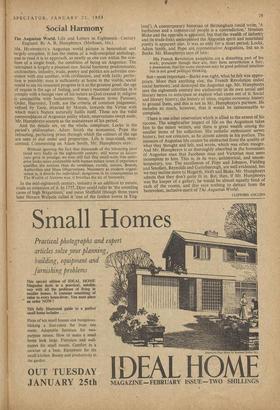Social Harmony
The Augustan World. Life and Letters in Eighteenth - Century England. By A. R. Humphreys. (Methuen, lbs.)
MR. HumPiiRr.vs's Augustan world picture is benevolent and largely complete. It has the merits of a well-compiled anthology, and to read it is to approach, as nearly as one can within the con- fines of a single book, the condition of being an Augustan. The retrospect is largely a pleasant one. Social harmony predominates; architecture, industry, trade, poetry and politics are activities con- sistent with one another, with civilisation, and with faith; perfec- tion is possible; man is sufficiently at home in the visible, social world to see his reasoned progress in it as the greatest good; the age of reason is the age of feeling, and man's reasoned activities in it comply with a benign view of his nature as God created it; religion is compatible with humanism; Sense, Reason (even Passion), Order, Harmony, Truth, arc the criteria of common judgement, refined by Taste, directed by Morals, towards the Virtue with which man's Nature naturally fulfils itself. These are the valid commonplaces of Augustan polity which, reservations swept aside, Mr. Humphreys accepts as the mainstream of his period.
And the details are, on the whole, compliant. Locke is the period's philosopher, Adam Smith the economist, Pope the refracting, perfecting prism through which the colours of the age are seen in due order and proportion. Life is man-sized, man- centred. Commenting on Adam Smith, Mr. Humphreys says:.
Without ignoring the fact that thousands of the labouring poor fared very badly in the eighteenth century, still worse as laisser- faire grew in prestige, we may still feel that small-scale free enter- prise looks more compatible with human nature (even if experience qualifies the notion) than do combines, cartels, unions, Boards, Authorities and Mass Observations. Necessary as modern organi- sation is, it dwarfs the individual; dangerous in its consequences as The Wealth of Nations was, it breathes the air of humanity.'
In the mid-eighteenth century, industry is an addition to nature, trade an extension of it. In 1757, Dyer could refer to 'the sounding caves of high Brigantium: and mean Sheffield (though three years later Horace Walpole called it 'one of the foulest towns in Eng- land'). A contemporary historian of Birmingham could write, 'A barbarous and a commercial people is a contradiction.' Mention Blake and the opposite is apparent, but that the wealth of industry and its trade-links underpinned the Augustan spirit and nourished poetry is apparent also. It was so only for a short period. Locke. Adam Smith, and Pope are representative Augustans, but so is Burke. Mr. Humphreys says of him : His French Revolution pamphlets arc a disturbing part of his work; prescient though they are, they have nevertheless a fury, a possession, that for some purposes may be good political intuition but is not good political thinking.
But—most important—Burke was right, what he felt was appro- priate. More than anything else, the French Revolution ended social harmony, and destroyed the Augustan age. Mr. Humphreys sees the eighteenth century too exclusively in its own social and literary terms to anticipate or explain what came out of it. Social and literary history, the history of ideas, require economic history to ground them, and this is not in Mr. Humphreys's purview. He includes so much, however, that it would be unreasonable to complain.
There is one other reservation which is allied to the extent of his success. The sought-after impact of life on the Augustans takes him to the minor writers, and there is great wealth among the smaller items of his collection. His catholic enthusiasm serves history, but not criticism, as he almost admits in his preface. The measure of Augustan life cannot be abstracted from the quality of what they thought and felt, and wrote, which was often meagre. And Mr. Humphreys is so thoroughly absorbed in the humanism of Augustan man that Jacobean man and Victorian man seem incomplete to him. This is, in its way, unhistorical, and uncon- temporary, too. The excellences of Pope and Johnson, Fielding and Smollctt, Reynolds and Gainsborough, arc well evidenced, but we may incline more to Hogarth, Swift and Blake. Mr. Humphreys admits that they don't quite tit in. But, then, if Mr. Humphreys was 'the keeper of a gallery, he would be almost equally fond of each of the rooms, and this says nothing to detract from the benevolent, inclusive merit of The Augustan World.
CLIFFORD COLLINS


































 Previous page
Previous page